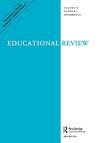不可教之人:残疾人权利与黑人特殊教育的发明
IF 3.4
3区 教育学
Q1 EDUCATION & EDUCATIONAL RESEARCH
引用次数: 0
摘要
黑人学生在主观残疾类别中的比例过高,特别是情绪/行为障碍(E/BD)、智力残疾(ID)——以前被称为可教育智力迟钝(EMR)和学习障碍(LD),以及停学和开除等纪律实践,是美国教育系统中一个持久的挑战(Losen & Orfield, 2002)。尽管学者、政策制定者和教育工作者在各个层面进行了广泛的努力,但这个问题仍然存在。本文章由计算机程序翻译,如有差异,请以英文原文为准。
The unteachables: disability rights and the invention of black special education
The overrepresentation of Black students in subjective disability categories, specifically emotional/behavioral disturbance (E/BD), intellectual disability (ID)—previously referred to as educable mentally retarded (EMR), and learning disability (LD), as well as in disciplinary practices such as suspension and expulsion, is an enduring challenge within the U.S. education system (Losen & Orfield, 2002). Despite extensive efforts by scholars, policymakers, and educators at various levels, the issue continues to persist.
求助全文
通过发布文献求助,成功后即可免费获取论文全文。
去求助
来源期刊

Educational Review
EDUCATION & EDUCATIONAL RESEARCH-
CiteScore
7.90
自引率
3.00%
发文量
105
期刊介绍:
Educational Review is a leading journal for generic educational research and scholarship. For over seventy years it has offered scholarly analyses of global issues in all phases of education, formal and informal. It publishes peer-reviewed papers from international contributors across a range of education fields and or perspectives including pedagogy and the curriculum, history, philosophy, psychology, sociology, international and comparative education and educational leadership. Articles offer original insights to formal and informal educational policy, provision, processes and practice and the experiences of all those involved in many countries around the world. The editors welcome high quality, original papers which encourage and enhance debate on social justice and critical enquiry in education, besides innovative new theoretical and methodological scholarship. The journal offers six editions a year. The Board invites proposals for special editions as well as commissioning them.
 求助内容:
求助内容: 应助结果提醒方式:
应助结果提醒方式:


